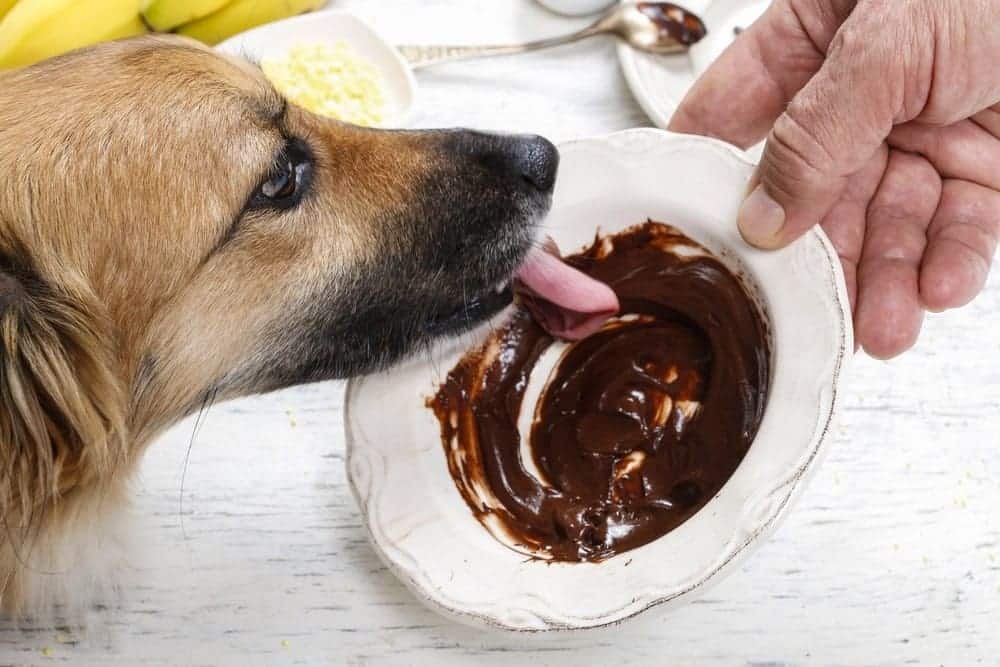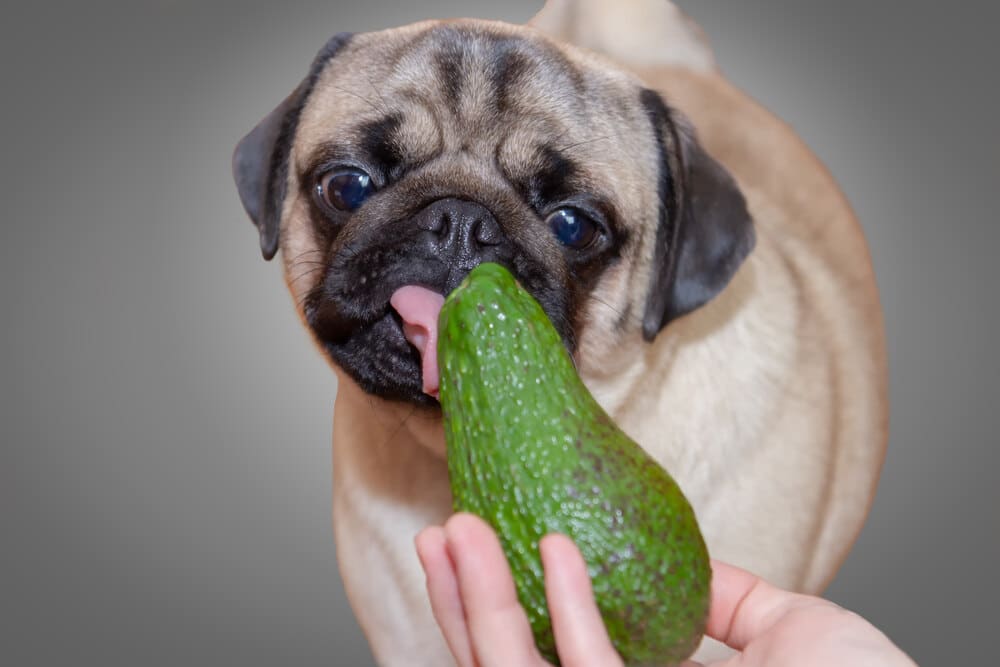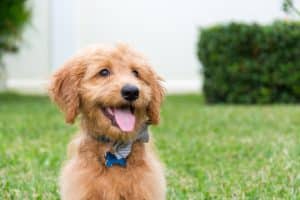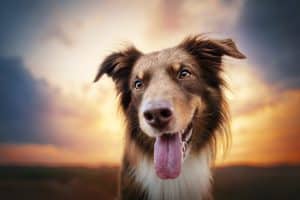Dogs are big food lovers. Their meals are the highlight of their day, and hardly any dogs are fussy about what is served in their bowls.
But it is important to know What Can Dogs Not Eat?. And we all know nothing is more difficult than refusing your paw friend’s requests when they are making puppy eyes at you. So, what should you do?
What Can Dogs NOT Eat?
- Fruits: Avocados, cherries, peaches, plums, grapes and raisins, tomatoes (avoid ripe ones as well to be safe), persimmons
- Nuts: Macadamia nuts, pistachios, black walnuts, raw cashews
- Vegetables: Onions, garlic, chives, leeks, wild mushrooms
- Beverages: Tea, alcohol, coffee, or drinks containing caffeine
- Other Common Foods: Salt, chocolate, xylitol (artificial sweetener), dairy, fatty foods, raw dough
Why are these foods bad for dogs?
- Toxicity: Some contain chemicals like cyanide (cherry pits), solanine (tomatoes), or theobromine (chocolate) that are poisonous to dogs.
- Digestive Issues: Dogs can’t process onions, dairy, or fatty foods well, leading to upset stomachs, diarrhea, or worse.
- Choking Hazards: Nutshells, seeds, or pits can block their digestive tracts or even their windpipe.
Signs Your Dog Ate Something Harmful
- Unusual Behavior: Lethargy, excess sleep, lack of energy
- Digestive Upset: Vomiting, diarrhea
- Other Symptoms: Dryness, itchiness, changes in appetite or urination
What to Do if Your Dog Eats Something Bad
- Don’t panic: But act quickly.
- Remove the source: Prevent further access to whatever caused the issue.
- Seek veterinary help: Call your vet immediately, even if you’re unsure of the severity. Don’t attempt home remedies without a vet’s guidance.
Key Takeaways
- Prevention is Key: Dog-proof your house, especially the kitchen. Keep harmful foods well out of reach.
- Know the danger: Familiarize yourself with the full list of unsafe foods for dogs.
- Act Fast: Don’t delay seeking professional help in cases of potential poisoning.
- Educate yourself: Learn about dog-safe snacks and treats you CAN share to avoid accidental harm.
Contents
- 1
- 2 What Can Dogs Not Eat?
- 3 What Fruits Can a Dog Not Eat?
- 4 What Nuts Can Dogs Not Eat?
- 5 What Vegetables Can a Dog Not Eat?
- 6 What Beverages Can Dogs Not Drink?
- 7 What are Some Other Common Foods That Dogs Can’t Eat?
- 8 How to Know if Your Dog has Eaten Something it Shouldn’t Have?
- 9 What to Do if Your Dog has Eaten Something Bad?
What Can Dogs Not Eat?
Besides feeding them their packed dog food, you might feel the need to treat your dog with other kinds of food available at home. But it is important to keep the following list in mind and avoid these foods as dogs have a different digestive system and cannot handle the same kinds of foods as we humans.
Start learning to say no to your dog’s requests, as there will be many for the food you are eating. If it is difficult to remember what to avoid, stick to the food available for dogs only in your market.
Contact a vet to create a diet plan that can help guide you with your dog’s nutritional needs but also according to their taste. Here are some major categories of foods that you must not feed your dog:
What Fruits Can a Dog Not Eat?
While fruits seem very enticing with their colorful appearance and juicy flavors, many of them cannot be fed to dogs.
Avocado
Dogs can not eat avocados. Although they are supposed to be full of healthy nutrients and a popular breakfast snack for humans, the chemicals in the fruit can cause stomach problems like diarrhea and vomiting in your dog.
Cherries, Peaches, and Plums
Cherries might look like small, pretty bells of luscious red fruit, but they also have tiny seeds in them which have cyanide. Cyanide is a poisonous chemical that is capable of affecting you immediately.
While we can easily spit out the seeds while eating the fruit, our dogs might end up swallowing them. Peaches and Plum pits also have the same issue, so you should avoid keeping these fruits around your dog.
Grapes
This fruit, in every form, can cause problems for your dog. Grapes come in many types, like the bigger ones, green ones, black ones, and then the dried version, that is, raisins.
This can severely affect your dog’s kidney to the point of failure. Avoid any food product with grapes or raisins in the ingredients.
Tomatoes
Moving past the controversy surrounding tomatoes being fruit, you should avoid feeding these to your dogs.
The slightly stiff part of the green fruit is the one that is the reason for the blacklisting of tomatoes as it has solanine which is toxic if consumed in large amounts. So, while a bit of the fruit can be fine, it is better not to feed your pet any of it.
Persimmons
This is another fruit with safe flesh, but the seeds are the real issue. Persimmons have big seeds that can choke up your dog’s small intestine and mess up the digestion system, causing diarrhea and, eventually, high fever.
What Nuts Can Dogs Not Eat?
Nuts are one of the foods that are popular in causing allergies in human beings. The same goes for dogs too. Some nuts just don’t suit their bodily functions, and no matter how healthy they seem, you should refrain from sharing these with your paw friend.
Here’s a list of the nuts dogs cannot eat:
Macadamia Nuts
All dogs are inherently allergic to these nuts. It can cause them muscle problems, vomiting, and fever. Avoid all foods with macadamia in them too.
Pistachios
Think of this nut as something you would not hand to a toddler because they won’t know what parts of the nut are eatable. The shell, when swallowed, can get blocked in their stomach, or worse, windpipe and choke them. Pistachios are also generally seasoned, which can be harmful to dogs.
Black Walnuts
These are very toxic for dogs. The effect is neurological as it can cause tremors and seizures, the worst-case scenario.
It happens because of the moldy husks that grow on specific foods, including these nuts. You should avoid all kinds of stale nuts as most have dangerous mold.
Raw Cashews
It is more about their texture than their chemical components that are bad for dogs. They can create problems in digestion when eaten raw. If they are roasted, their texture changes and becomes easier to digest.
What Vegetables Can a Dog Not Eat?
As a dog owner, you are constantly looking for ways to make your dog’s diet healthy and maintain a healthy weight. This can make you want to replace meat with veggies from your dog’s meal bowl.
But again, some vegetables are toxic for your dog instead of being healthy. Here are the vegetables that your dog cannot eat:
Onions
While the family of onions, including garlic, green onions, leeks, and chives, adds great flavor to all our food, it does quite the opposite for our dogs.
When consumed in significant amounts, this family of vegetables can affect the circulation of oxygen through the blood, which can result in nausea, vomiting, and on the permanent side, anemia. This is only a problem if they eat a large enough amount, but it’s better to avoid it as much as possible.
Mushrooms
The ones brought from the store that are safe for us to eat, like Shitake mushrooms, are just as safe for your dogs. But any other mushroom you are unfamiliar with and found under a tree in the woods, do not let your dog play with or eat it.
What Beverages Can Dogs Not Drink?
Although this is not food, it is important to keep these in mind when you sit down for a meal with your dog. Drinks of many kinds usually accompany our foods, so you should know what can be shared with your dog and what not. Here are some beverages that your dog cannot drink:
Tea
While it is a relaxing and healthy drink for humans, the same can’t be said about dogs. Tea has caffeine, which might not affect us as much as physical energy and energization.
But for dogs, this could be a lot more, resulting in a high heart rate, nausea, and diarrhea. Don’t leave tea cups or tea bags unguarded around your dog.
Alcohol
Some might think this is obvious, but many pet owners might not know that alcohol can be very dangerous for dogs.
The effect of alcoholic beverages on the mental state of dogs is much larger than what it is for us. It can lead to them getting seizures, entering a coma, or even facing an untimely death.
Coffee
As mentioned before, dogs cannot handle caffeine. And coffee is full of caffeine, even more than tea at times. Avoid keeping remnants of your drink like coffee grounds or beans around your dog.
Given the effect of caffeine on dogs, it is also advised not to make them drink any kind of energy or soft drinks as they have large amounts of caffeine in them.
What are Some Other Common Foods That Dogs Can’t Eat?
Besides the broad categories, these are some general foods commonly found in households and our meals not made for dogs. Dog owners and lovers must take special care of these foods as they are found everywhere and are also part of many other common foods as ingredients.
This gives easier access to your dogs to these foods, and even you might mistakenly feed them these. Here’s a list of other foods that you must not let your dog eat:
Salt
We might not be able to live without salt in our daily meals, but for dogs, if consumed in more than just a small amount, it can end up being problematic.
Their body cannot handle that much sodium, and it damages their kidneys. Avoid feeding them anything with salt, especially if it’s in large amounts.

Chocolate
Everyone’s beloved food, chocolate, is not so beloved to dogs. Chocolate has caffeine and theobromine, which take a huge toll on their hearts and can cause seizures or even death. Sweeter milk chocolates in small quantities are still fine, but you should avoid feeding them more.
Artificial Sweetener
Xylitol is a popular artificial sweetener in many packaged foods like candy or cookies. Checking ingredients on the packaging becomes important since this sweetener is known for damaging dogs’ livers and causing their blood sugar levels to drop.
Dairy and Fatty Food
Dairy products are made from animal products and have animal fat. These can be difficult on the stomachs of your paw friends and can cause digestive problems.
The same goes for fried foods that are full of fat from the oil. They can face stomach aches and diarrhea because of these heavy foods.
Raw Dough
Dough, in general, is harmful to your dog’s insides. But when it has yeast, it amplifies the damage it can cause in the stomach as yeast keeps on multiplying and can cause blockages in various bodily functions.
How to Know if Your Dog has Eaten Something it Shouldn’t Have?
It is possible that your dog might grab something while you aren’t looking and end up being something toxic. You can look for signs and symptoms to stop the problem from worsening and get to a vet fast.
Most symptoms are just strange behaviors you have not noticed in your dog before. This could be them staying strangely quiet, sleeping a lot, not being too active, etc.
More obvious signs would be vomiting and diarrhea, as these are generally what happens when they eat something bad.
Other symptoms include lack of appetite, dryness, feeling itchy for an extended period, and a change in urination habits.
What to Do if Your Dog has Eaten Something Bad?
It is important to act fast after you get to know your dog has eaten something bad. Do not try anything on a whim like home remedies unless it’s something recommended by a vet.
Keep your dog away from the source of poisoning and try to keep them from dozing off. Get your dog medical help as soon as possible to cure the problem properly and permanently.
You don’t have to panic too much about your dog eating something wrong. Even they eventually learn what is good for them and what is not.
But since they are equivalent to how a toddler would act, you might want to dog-proof your kitchen and ensure that what dogs can not eat is not left out in the open for them to eat easily. Have safe meals with your dogs and enjoy the treats that you can share with them.








